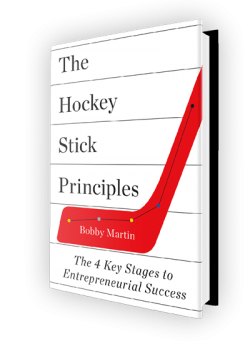Brian de Haaff’s recent LinkedIn post “Why This CEO Will Never Hire Another Salesperson” earned serious PR for his two-year-old roadmap software company, Aha!: half a million views and 2,300 comments. He says the post is his “first volley in a healthy debate.” Brian, chase down this top-spin lob if you can.
Instead of hiring commissioned salespersons who carry a quota, Brian says that Aha! has created a Customer Success Team, a group of well-compensated employees who take care of prospective customers. From my understanding, Apple Stores don’t compensate their salespersons with commission either, and for me, the experience there has been strikingly warm and easy-going. So it’s not a bad idea. But does that make it best for your firm?
Brian says buyers of emerging technology want relationships, authenticity, collaboration, and information, strongly implying commissioned salespersons can’t provide these things. Though he doesn’t blame them, saying “It’s not them though and they should not be blamed, it’s how they are motivated that’s all wrong.”
Many high-tech firms do push products by investing in huge marketing budgets for driving sales leads, and their Sales VPs must hit their revenue targets each month. This has created some brutal sales cultures. You know the drill, “… first prize is a Cadillac Eldorado … Second prize? A set of steak knives. Third prize is you’re fired.”
A friend of mine, who wishes to remain anonymous, worked as a commissioned sales rep for a well-known high-tech firm and had this to say: “Their ‘Core Values’ are meaningless. They certainly don’t practice what they profess, and all they care about are the numbers and not their employees. You don’t go home unless you have booked a certain amount of demos or made 150 calls. There was no value-selling. ” I couldn’t agree more that this way of working with commissioned reps is all wrong.
But I’ve hired dozens of commissioned salespersons who’ve been great relationship-builders, authentic, collaborative, and informative. I’ve started two firms, First Research, provider of sales and marketing-friendly industry profiles, in 1999 (sold in 2007 to Dun & Bradstreet), and Vertical IQ, a similar firm, which launched in 2010. These sales professionals are patient and don’t push products. We don’t hold them accountable each week, month, or quarter to hit some arbitrary sales number. They work hard to make sure customers are successful, which is why Vertical IQ has a 98% renewal rate. And guess what? They earn commission for making existing customers happy as well. But they also have challenging jobs because we don’t raise capital, and therefore, we have small marketing budgets. They must work hard to find their own leads, cold call, listen carefully, run successful pilots, and manage the complexity of a negotiation. Selling like this is a unique skill, and most aren’t cut out for the difficulties that go along with it. I doubt I could attract this type of salesperson if they worked for a set salary. I doubt they’d think it was worth the heartache and disappointment that come along with this type of job. In a way, they’re entrepreneurs themselves—constantly battling risk versus reward—perfectly aligned with the goals of the company’s owner.
So if you’re an entrepreneur or an aspiring one, think about the perspective of those who provide you advice. For this issue, you now have two perspectives: Brian de Haaff’s and mine. I have no problem sharing the revenue I receive as an owner with the salesperson when they land another happy customer. And guess what? Our customers are happy. So are we.
Sign up to get more great insights directly to your inbox.
As a special bonus, you'll also immediately get access to my inside analysis of what made 172 diverse companies achieve take-off revenue growth.

Hi Bobby,
I really enjoyed your post and I think its important to provide a different perspective to Brian de Haaff. While I agree with you and admire your approach, I think it is rare. The sales person stereotype does not present them as genuine, relationship-driven people. They’re pegged as vultures… mining for the sale and willing to go to most lengths to hit their number. In most organizations, it then moves to a customer success manager or account manager to worry about the relationship. The sales person is MIA and un-phased.
So how does a company create a compensation plan and a culture where the sales people are motivated by their bonus and closing deals, but also puts in the extra effort to build lasting relationships. Building the relationship takes more time… takes more soul… takes more skill. One solution is to build in retention as part of the sales person comp plan, but there are issues and questions of fairness with that approach.
I like what you’re saying about framing the sales person as an entrepreneur and treating their prospects/accounts as their book of business.
How does the sales leader prepare for this kind of approach? How can you pitch this approach to the CEO? The relationship will pay off in the long run, but the dollars may take longer to follow.
That’s really good. It represents your story and your philosophy and based on your experience so it strikes me as very authentic and enjoyable to read.
Clearly there is no right answer for this stuff. You have your way. He has his. And you both attract the kind of people that help make each way work. Good stuff.
Every industry is different, which is why Vertical IQ is so valuable to their clients. Every company is different, which is why company intelligence is so important. If all industries and companies are different, then one single sales/marketing model can’t possibly fit all.
The best leaders are good at evaluating their own industry, their own company, their clients, prospects, and then tailoring a model that works.
Personally, I prefer Bobby Martin’s model for my company. However I can understand why Brian’s model also works really well for his.
Great post!